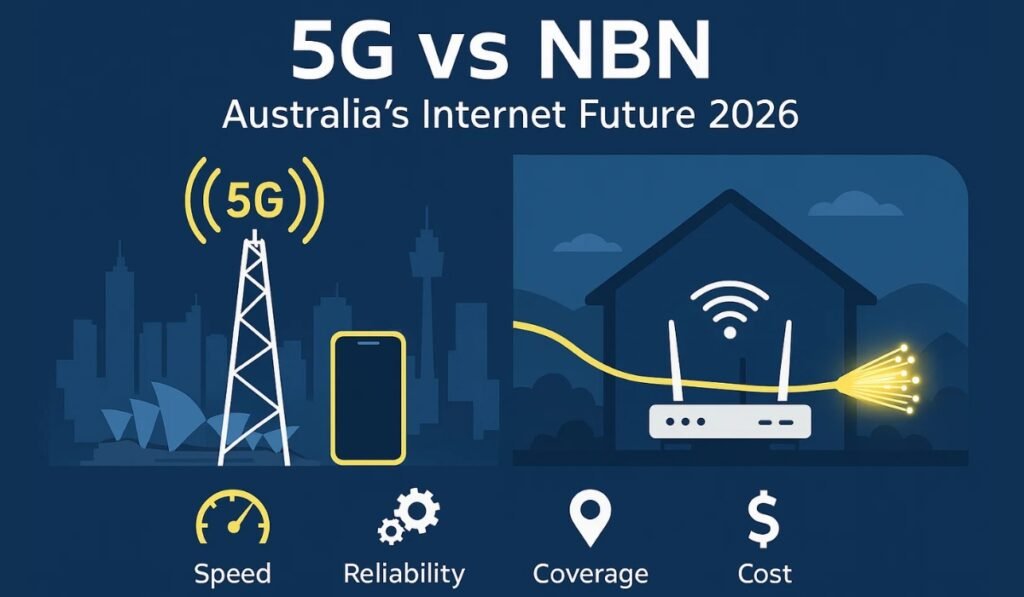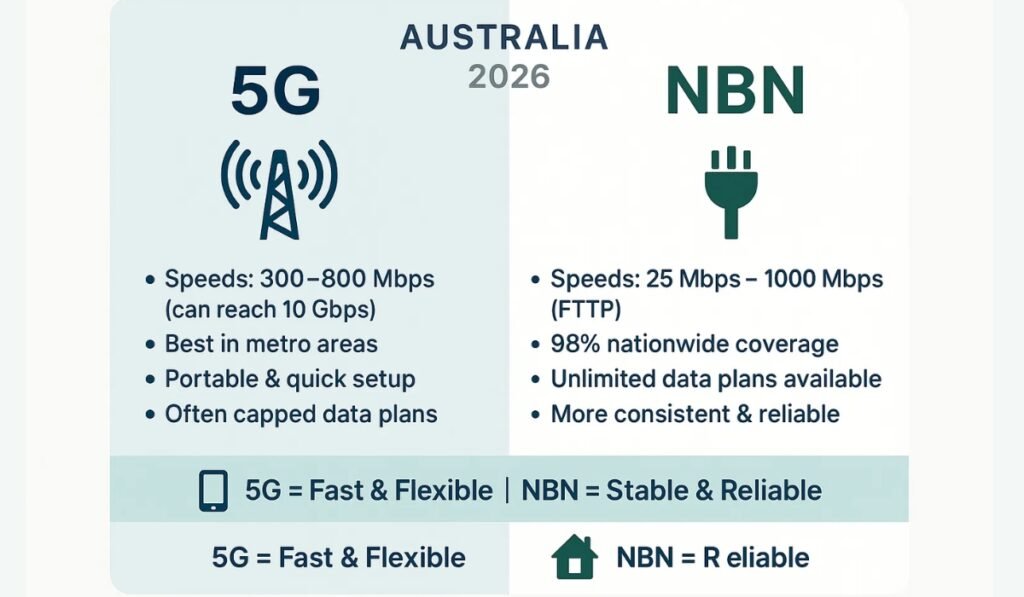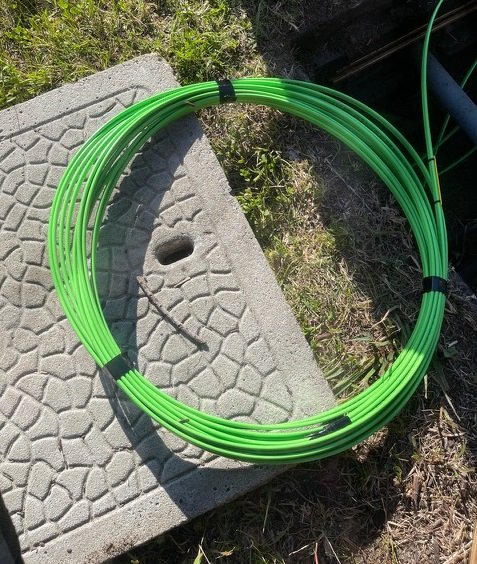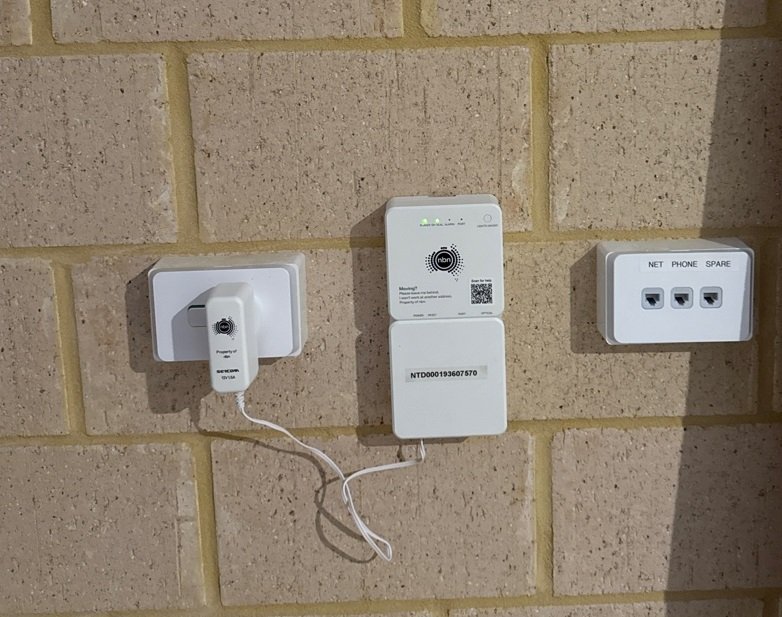Australia’s internet future is being shaped by two major players: 5G vs NBN. Both promise high-speed connectivity, but they differ in reliability, coverage, and long-term value. As we move into 2026, many Australians are asking: Which one should I choose for my home or business?
This guide answers the most important questions about 5G and the NBN, so you can decide which option best suits your lifestyle.

What Is the Difference Between 5G and NBN?
The main difference lies in how they deliver internet:
- 5G: A wireless mobile technology using towers to provide high-speed internet directly to devices or home modems.
- NBN: A fixed broadband network built with fibre, copper, fixed wireless, and satellite infrastructure to connect households and businesses across Australia.
In short: 5G is flexible and mobile, while NBN is fixed and consistent.
Which Is Faster: 5G or NBN in 2026?
- 5G Speeds: Can reach 1–10 Gbps in theory, with real-world speeds around 300–800 Mbps in capital cities.
- NBN Speeds: Depend on the technology type. Fibre-to-the-Premises (FTTP) can deliver up to 1000 Mbps, while older connections like Fibre-to-the-Node (FTTN) may only achieve 25–100 Mbps.
Answer: In ideal metro conditions, 5G can be faster, but NBN fibre is more consistent, especially for households with multiple users.
Which Is More Reliable: 5G vs NBN?
- 5G: Performance can drop with weak signal, congestion, or bad weather. Reliability is strongest in well-covered metro areas.
- NBN: Fibre is very stable, while satellite NBN may slow down in poor weather.
Answer: For day-to-day reliability, NBN fibre wins.
Which Has Better Coverage: 5G or NBN?
- 5G: Rapidly expanding in cities and large regional centres, but patchy in rural Australia.
- NBN: Covers 98% of Australian households through fibre, fixed wireless, and satellite.
Answer: NBN still has the edge in nationwide coverage.
Which Is Cheaper: 5G vs NBN?
| Plan Type | 5G Plans (2026) | NBN Plans (2026) |
|---|---|---|
| Entry Level | $60/month (often capped) | $50/month (25 Mbps, unlimited data) |
| Mid-Tier | $70–$80/month (200–500 GB) | $80/month (100 Mbps, unlimited data) |
| High-End | $90+/month (often capped) | $100–$120/month (1000 Mbps fibre, unlimited) |
Answer: For heavy users, NBN is better value because most plans include unlimited data. 5G is more flexible but often capped.
Who Should Choose 5G Over NBN?
Pick 5G internet if you:
- Live in a city with strong 5G coverage
- Rent or move house frequently and want portable internet
- Need quick setup without waiting for technicians
- Value low latency for online gaming or video calls

Who Should Choose NBN Over 5G?
Pick NBN internet if you:
- Live in regional or rural areas
- Have a family or business needing unlimited data
- Run a smart home with multiple connected devices
- Want consistent, reliable speeds for streaming, remote work, or study
Will 5G Replace the NBN in Australia?
No. Telecommunications experts and government reports confirm that 5G and NBN will complement each other rather than compete head-on.
- 5G is ideal for mobile and flexible connections.
- NBN fibre remains the backbone for stable, high-capacity home and office internet.
Answer: 5G will not replace the NBN—it will work alongside it.
What Are the Key Takeaways on 5G vs NBN in 2026?
- 5G can deliver faster speeds, but only in well-covered areas.
- NBN provides wider coverage across Australia.
- NBN is better value for unlimited data, while 5G suits those who want portability.
- The future of internet in Australia is not 5G or NBN, but both working together.
FAQs on 5G vs NBN
Q1: Is 5G better than NBN for gaming?
Yes, 5G’s low latency makes it excellent for gaming, but NBN fibre offers more stability for long sessions.
Q2: Can 5G handle multiple users in one home?
It can, but performance may slow if the network is congested. NBN fibre is more reliable for large households.
Q3: Will 5G replace the NBN?
No. NBN is government-backed infrastructure and will continue to operate. 5G is a complement, not a replacement.
Q4: Which is better for rural areas?
NBN (satellite or fixed wireless) covers far more rural households than 5G.
Q5: Will 5G prices get cheaper by 2026?
Yes. As providers compete, Australians can expect cheaper 5G plans with larger data allowances.
The choice between 5G vs NBN in 2026 depends on your location, your lifestyle, and your budget. In cities, 5G may be the faster and more flexible option. Across regional Australia, the NBN remains the most reliable way to stay connected. For many households, the best option will be a mix of both.
👉 If you’re upgrading or moving your setup, make sure your NBN NTD Box is in the right location. A professional relocation ensures stronger WiFi coverage, faster speeds, and fewer dropouts.
Explore our NBN NTD Relocation services here.

